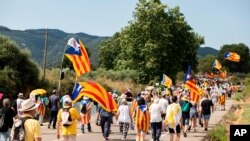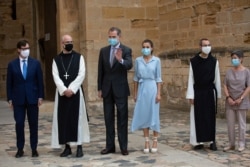Hundreds of Catalan independence supporters protested the visit of King Felipe VI and Queen Letizia on Monday to the northeastern region as part of a royal tour across Spain that is meant to bolster spirits amid the coronavirus pandemic.
The visit came as a barrage of media leaks accuse the king's father, former monarch Juan Carlos I, of allegedly hiding millions of untaxed euros in offshore funds.
Prosecutors in the country's Supreme Court are determining whether the king emeritus can be investigated for receiving the funds from Saudi Arabia, possibly as kickbacks for a high-speed railway project. Juan Carlos hasn't publicly addressed the allegations against him.
The scandal is the latest to rock the Spanish royal family. In mid-March, it prompted Felipe to renounce any inheritance he could receive from his father and stripped him of the annual stipend as king emeritus. Juan Carlos abdicated on behalf of his son in 2014.
With that backdrop, the royal couple launched a visit to all of Spain's 17 regions that was designed as a show of support for the citizens and the economy as it recovers from the first wave of the pandemic.
The Catalan leg of the tour was initially planned for last week covering several towns and Barcelona, but the monarchy said it had postponed it and scaled it back to a short visit to a monastery because of the spike in virus cases in and around the regional capital.
Protesters on Monday carried photos of Felipe upside down and letters completing the sentence "Catalonia doesn't have a king" during a march organized by ANC, the region's largest pro-independence civil society group.
The march was headed to the Royal Monastery of Poblet, where the king and the queen were visiting, but police blocked access at the main road. Some of the activists tried to reach the monastery by venturing into nearby vineyards.
High-speed and regular trains in and out of the northern Catalan city of Girona were also delayed or cancelled due to "acts of vandalism," according to a tweet by Spain's railway infrastructure operator, ADIF. A photo circulated on messaging apps showed tires burning on railways next to a sign showing a crossed out upside down image of a crown.
Tensions between separatists in Catalonia, which has a population of 7.5 million, and those in support of Spanish unity came to a head in late 2017 following a banned referendum met with police violence that led to the prosecution of top elected officials and activists.





